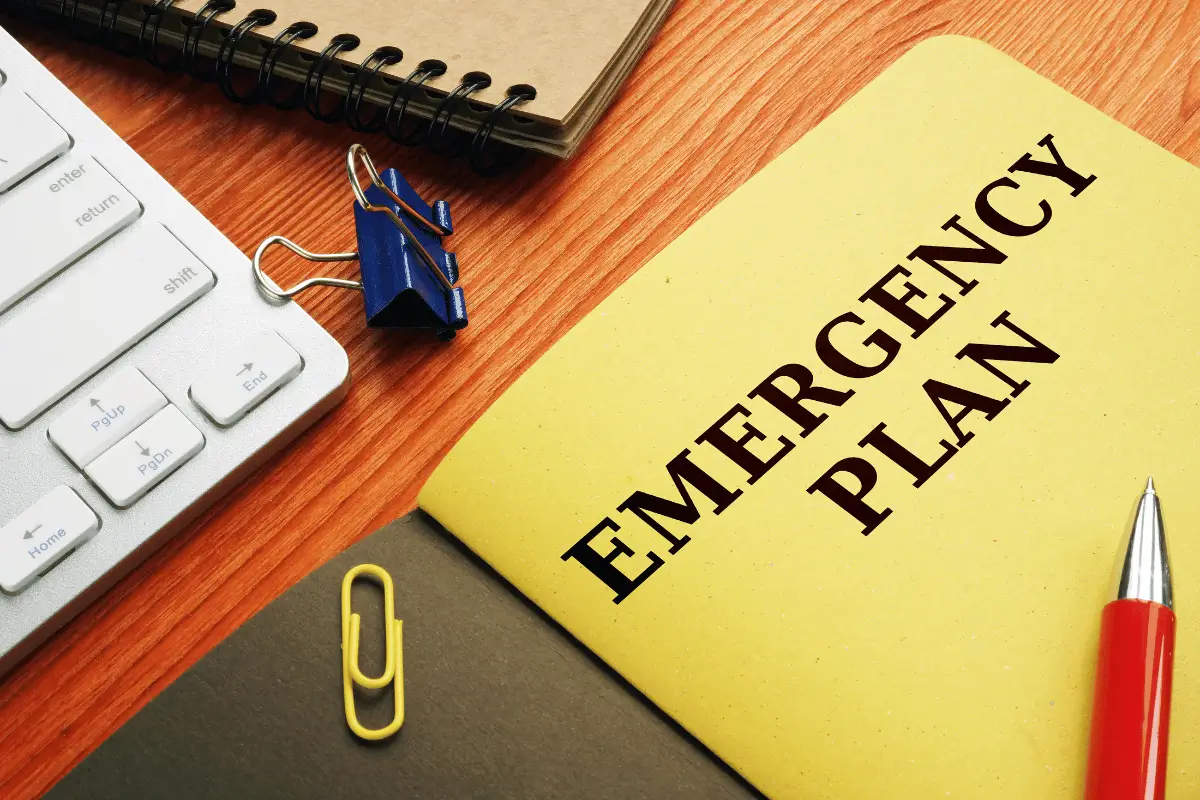I love surprises! I mean, don’t we all? A surprise birthday party, an out-of-the-blue gift, a sudden visit from an old friend, and the best of all – unexpectedly finding money in a pair of old jeans!
That’s the beauty of life – that it’s full of surprises! While many are joyful, some can be challenging. Financial emergencies fall under the not-so-fun and challenging category. These can strike unexpectedly and can cause stress, perhaps even disrupting our financial stability. However, with proper preparation and a hopeful mindset, we can navigate these situations with confidence.
First, let’s understand what constitutes financial emergencies
What is a Financial Emergency?
A financial emergency refers to an unexpected and urgent situation that significantly impacts our or our family’s financial stability. It usually demands immediate attention and often involves unanticipated expenses or a sudden loss of income. Its very nature is that of being unplanned.

Dealing with a financial emergency requires prompt decision-making, financial resource management, and the execution of strategies to mitigate negative financial impact.
Types of Financial Emergencies
Financial emergencies come in various forms. Understanding them is the first step towards preparedness.
1. Medical Emergencies
What is a medical emergency? Typically, this covers a sudden illness or injury that can lead to significant medical expenses. A medical emergency requires immediate attention and often comes with unexpected bills, hospital stays, and ongoing treatments.
2. Family Emergencies
These can range from unexpected childcare expenses to providing financial support to loved ones facing difficult times.
3. Natural Disasters
Natural disasters, such as floods, earthquakes, or cyclones can cause extensive property damage. Repairing or rebuilding your home, replacing damaged belongings, and temporarily relocating are part of such a financial emergency.
4. Home Repairs
Home emergencies, such as a leaking roof or a faulty plumbing system, fall under this category. Urgent repairs or renovations require a significant financial investment to ensure the safety and functionality of our homes.
5. Major Car or 2-Wheeler Repairs
Car or 2-wheeler breakdowns or accidents can lead to costly repairs or the need for a replacement vehicle. These unexpected expenses can have a strain on our budget. Setting up an emergency fund to dip into can alleviate any stress related to such an expense.
6. Loss of Job or Income
A commonly experienced financial emergency is losing a job or experiencing a sudden reduction in income. Without a steady paycheck, it can be challenging to cover daily expenses, debt payments, and other financial obligations.
7. Legal Expenses
Legal emergencies, such as lawsuits or unexpected legal fees, can arise despite our best efforts. Proper preparation is required to prevent these unexpected legal matters from affecting our financial stability.
8. Travel Mishaps
While travel is exciting, unexpected events like trip cancellations, lost luggage, or medical emergencies abroad can cause financial setbacks. Most of these can be tackled with travel insurance of good terms and coverage.
9. Mental Health Breaks
Taking care of our mental well-being is essential, and sometimes we may need to take a break from work or other responsibilities. Financially preparing for a mental health break allows us to take the time we need without experiencing excessive financial stress.
By being proactive and resilient, we can minimize the impact of these 7 financial emergencies and foster long-term financial recovery.
Emergency Budgeting and Financial Stress Management
A financial emergency can stress out even the strongest of us. But worry not, there are ways to tackle such situations, as with almost anything in life. You can even take this opportunity to whip your personal finances in shape. These strategies can help with the management of financial stress that can be caused by emergencies and unplanned expenses.
Evaluate Your Expenses
Thoroughly review your current budget and identify areas where you can cut back temporarily. Trim non-essential expenses and focus on necessities to free up funds for emergency situations.
Communicate with Creditors
In the event of financial emergencies, reach out to your creditors as soon as possible, and explain your situation. They may be willing to work out an adjusted payment plan or provide flexibility till you tide through the situation.
Look for Support and Seek Professional Advice
Explore resources and assistance programs that can provide temporary relief during a financial emergency. Local organizations, government agencies, or charitable institutions may offer financial aid or counselling services.
A financial advisor or counsellor can provide personalized and tailored guidance. They can help you create a roadmap for recovery and offer valuable insights to help you regain control over your finances.
Prioritize Self-Care
Taking care of yourself is important, especially in tricky situations. Engage in stress-alleviating activities such as exercising, meditation, or spending time with loved ones. A positive mindset and emotional resilience can do wonders when it comes to making it through trying times.
Creating an Emergency Fund
One of the best ways to prepare for financial emergencies is to set up and contribute to an emergency fund.

Here are tips to create one.
1. Set a Monetary Goal
Decide on the amount to save for emergencies. A popular recommendation is to save at least three to six months’ worth of living expenses. Start small, and gradually and consistently build up your fund over time.
2. Make Regular, Automated Contributions
Allocate a realistic portion of your income for your emergency fund. Set up automatic transfers to ensure consistent contributions each week or month.
3. Prioritize High-Yield Instruments
Save in a high-yield savings account that offers competitive rates of interest, or in a moderate return-low risk investment instrument. This way, your emergency fund can grow faster and provides some additional financial security. Don’t forget to seek out accounts or instruments that allow for instant or quick liquidity.
4. Say NO to Temptation
Avoid using your emergency fund for non-emergency purposes. Discipline and self-control are important to keep the fund untouched unless a financial emergency arises.
5. Replenish After Use
Once you’ve used a portion of your emergency fund, try to replenish the amount as soon as possible. Resume regular or increased contributions until your fund reaches its target balance.
Is a Sinking Fund an Emergency Fund?
A sinking fund is a savings account specifically set up to save money for a planned future expense or a large purchase. It allows for gradual savings over time, to ensure that you have enough funds when the expense or purchase is due. Sinking funds are typically used to save for expenses like vehicle replacements, home renovations, higher education, or tax payment.
While both sinking funds and emergency funds function to save money for future needs, they serve different purposes.
An emergency fund provides security for unexpected, unforeseen and unplanned expenses.
A sinking fund, on the other hand, is designated for anticipated or planned future expenses or goals that have a fixed financial commitment and time till occurrence.
Insurance
Availing insurance is a vital step in preparing for financial emergencies. Insurance transfers the risk of potential financial losses to an insurance provider. Whether it’s health insurance, home insurance, car insurance, or travel insurance, having the right coverage can safeguard you from significant financial burdens. Think of it as your personal financial safety net that offers you peace of mind.
Long-Term Financial Recovery Strategies:
After weathering a financial emergency, it’s time to pivot the focus to long-term recovery. If you are reading this blog as a cautionary tale or are the start of your career then it helps to make early money choices that can help you big time in the long run.

Here’s how you can emerge stronger than before.
- Adjust Financial Goals: Carve out time to reassess your financial goals and make necessary adjustments. Prioritize rebuilding your emergency fund and focus on saving for future goals.
- Review Insurance Coverage: Evaluate your insurance policies to ensure they provide adequate coverage against various financial emergencies. Consider topping up your health, home, and travel insurance to safeguard your financial well-being.
- Diversify Income Sources: Explore opportunities to diversify your income sources to create more stability. Consider additional part-time work, freelance gigs (if time permits) or passive income streams to supplement your primary source of income.
- Invest in Upskilling: Investing in your personal and professional development can place you in a better position for career advancement. Gain new skills, certifications, or qualifications to open doors to better job opportunities and financial growth.
- Maintain a Positive Mindset: Financial setbacks are temporary, and with resilience and determination, you can overcome them. Sometimes, we are so stuck in our ways and practices that it becomes difficult to let go when it is especially important to know when and how to let go of what’s holding us back. Focus on your long-term goals, celebrate small victories and milestones along the way, and stay hopeful about your financial future.
Financial emergencies don’t discriminate. A little planning and resilience go a long way to minimize their impact and foster long-term financial recovery. Building an emergency fund, practising emergency budgeting, and getting the right insurance coverage lay the foundation for financial resilience.



2 Comments